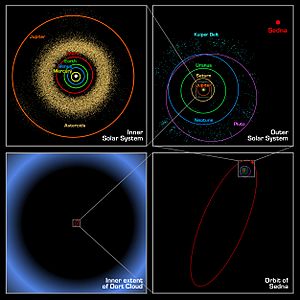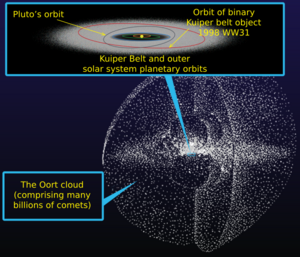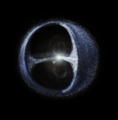Oort cloud facts for kids


The Oort cloud is a huge, faraway cloud of icy objects and comets. Scientists believe it surrounds our Solar System, much further out than Pluto and the Kuiper belt. Think of it as a giant, icy bubble around the Sun!
Astronomers think the Oort cloud is where many long-period comets come from. These are comets that take thousands or even millions of years to orbit the Sun.
This cloud is incredibly far away. It might be about 50,000 AU from the Sun. That's almost one light-year! To give you an idea, that's nearly a quarter of the way to Proxima Centauri, which is the closest star to our Sun.
The Kuiper belt and scattered disc are much closer to the Sun. They are less than one thousandth of the Oort cloud's distance. The outer edge of the Oort cloud marks the very boundary of our Solar System. It's where the Sun's gravity is still the strongest influence.
A Dutch astronomer named Jan Oort first suggested the idea of this cloud in 1950. The Oort cloud was named after him because of his important work.
What is the Oort Cloud Like?
The Oort cloud is truly enormous. It takes up a vast amount of space. Scientists believe it holds trillions of comets. These comets are spread out, often tens of millions of kilometers apart.
The Oort cloud has two main parts:
- The outer Oort cloud is loosely held by the Sun's gravity. Most long-period comets are thought to come from this part.
- The inner Oort cloud is also called the Hills cloud. It is more tightly bound to the Sun. It might be a "nursery" for new comets.
The objects in the Oort cloud are mostly made of ice. This ice can be water ice, methane ice, or ammonia ice. However, scientists have also found a rocky object called 1996 PW in an orbit like a long-period comet. This suggests that some rocky objects might also exist in the Oort cloud.
How the Oort Cloud Formed
Scientists believe the Oort cloud is what's left over from the early days of our Solar System. Long, long ago, a disk of gas and dust surrounded the Sun. The planets formed from this disk. The Oort cloud is thought to be made of the leftover bits and pieces from that time.
| The Solar System | |||||||
|---|---|---|---|---|---|---|---|
|
|
|||||||
| Sun • Heliosphere |
Planets ☾ = moon(s) ∅ = rings |
Mercury | Venus | Earth ☾ | Mars ☾ | ||
| Jupiter ☾ ∅ | Saturn ☾ ∅ | Uranus ☾ ∅ | Neptune ☾ ∅ | ||||
| Dwarf planets | Ceres | Pluto ☾ | Haumea ☾ | Makemake | |||
| Eris ☾ | |||||||
| Small Solar System bodies |
Asteroids (minor planets) |
Groups and families: Vulcanoids · Near-Earth asteroids · Asteroid belt Jupiter Trojans · Centaurs · Neptune Trojans · Asteroid moons · Meteoroids · Pallas · Juno · Vesta · Hygiea · Interamnia · Europa |
|||||
| See also the list of asteroids. | |||||||
| Trans- Neptunians |
Kuiper belt – Plutinos: Orcus · Ixion – Cubewanos: Varuna · Quaoar · Huya |
||||||
| Scattered disc: Sedna | |||||||
| Comets | Periodic comets and non-periodic comets Damocloids · Oort cloud |
||||||
| See also the list of solar system objects | |||||||
Images for kids
See also
 In Spanish: Nube de Oort para niños
In Spanish: Nube de Oort para niños
 | Janet Taylor Pickett |
 | Synthia Saint James |
 | Howardena Pindell |
 | Faith Ringgold |



